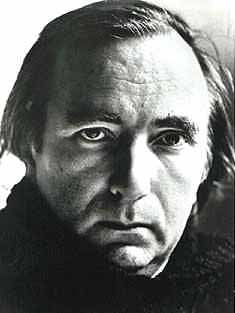Lev Navrozov
While living before his emigration in totalitarian Russia, Lev Navrozov did not want to contribute either to its propaganda or to its military might, and was making a living by translating Russian classical literature into English.
Secretly, he was an underground political thinker, concerned with the survival of the democratic West vs. dictatorships of Russia and China, anxious to prevent the domestic subversion of their power by establishing world domination.
As he arrived with his family in New York in 1972, he told The New York Times and a CIA senior analyst (who came with his two assistants to speak with Lev) that the dictatorship of Russia had been developing post-nuclear superweapons, to be able to destroy the Western means of retaliation in case of a Soviet nuclear attack and thus to circumvent Mutual Assured Destruction on which the defense of the West had been based. Neither The New York Times, nor the CIA, believed him, but Ronald Reagan did, met him, and publicly announced the tragic news, which the CIA declared to be “evil empiricism”, that is, his mania. But in 1992, after the fall of the Soviet dictatorship, Yeltsin opened to international inspection the biological section of the pre-1991 countrywide development of post-nuclear superweapons.
As an example from the new vast uncanny world of post-nuclear superweapons, Navrozov took nanoweapons. He declared K. Eric Drexler to be the Einstein of nanotechnology. Specifically, Navrozov is comparing Einstein’s famous warning to President Roosevelt about the viability of atomic weapons to Drexler’s 1986 book, Engines of Creation, where he warns about the viability of nanoweapons. Navrozov is concerned, however, that Drexler’s warning has been spurned and viciously ridiculed by the National Nanotechnology Initiative (NNI), an organization that Navrozov compares to the Manhattan Project as far as government allocations are concerned. But as Navrozov notes, the irony in all this is that the NNI has denied the military aspects of nanotechnology, and to Drexler and the Foresight Nanotech Institute he cofounded in 1986, the U.S. Congress has been refusing to allocate a cent.
“Imagine”, says Navrozov, “the U.S. Manhattan Project policy of tacit denial of the military importance of nuclear power, the implication being that the Manhattan Project, with all the money allocated for it, should concentrate on the development of nuclear power as fuel.” Disturbingly, while the Chinese have been startlingly open about the potential military uses of molecular assemblers, Navrozov notes that “the current government-NNI policy completely excludes research involved in molecular nano assemblers because of the false non-feasibility argument as put forward by Richard Smalley [a specialist in carbon nanotubes] with peremptory categorical zeal.” Ultimately, as the debate between Drexler and Smalley raged, Navrozov saw no harm in assuming that Drexler is right, for we should err on the side of caution. “Now, let us conjecture, for the sake of argument, the opposite”, argued Navrozov, “What would be the danger? That the West, including Dr. Smalley and his carbon nanotubes, would be reduced to dust or would surrender unconditionally to become a vast Hong Kong.”
Lev has been publishing his weekly columns in NewsMax.com (over 2 million “unique visitors” a month) and WorldTribune.com (near 2 million of them). Of late, he has received about 1000 emails from his readers expressing their horror at the geostrategic situation of today and begging him to continue his columns to wake up the West. As a journalist, author, and columnist, Lev has been called one of the most brilliant minds in the world by many distinguished Westerners and Russians. He has published over 1,000 columns and articles on the destiny of civilization, world culture, foreign policy, strategy, defense, and intelligence work since his emigration from Russia in 1972. He is the winner of the Albert Einstein Prize for outstanding intellectual achievements, and more than twenty of his articles are in the United States Congressional Record.
His book of 1975 (Harper & Row) The Education of Lev Navrozov: A Life in the Closed World Once Called Russia received over 100 reviews, comparing him to Mark Twain, Voltaire, Orwell, and Dostoyevsky. His current book, Out of Russia and Into the West, Blind to the Development in China of Post-Nuclear Weapons, is awaiting a publisher who has the guts to publish a book so ruthlessly frank about the mortal danger of China, in alliance with Putin’s Russia, and about the Western political establishment, oblivious to this mortal danger.
Lev is also looking forward to the publication of a collection of his columns on the subject.
He is president of the nonprofit Center for the Survival of Western Democracies, Inc., and its pitch can be emailed to whoever is interested in the survival of the democratic West in the era of Sino-Russian post-nuclear superweapons.
